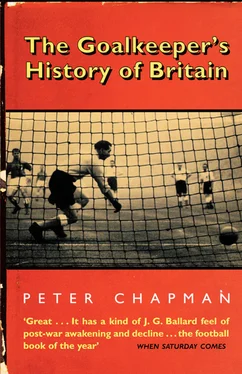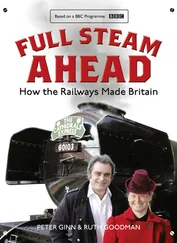The impact as he landed in the goalmouth might easily have been enough to dislodge the ball from his grasp and the air from his lungs. Having hit the ground it would have been understandable if he had stayed there a while, to gather his breath and thoughts, or take brief stock of any plaudits that might be on offer from his teammates or the crowd. Oh, and a good save by Matthews,’ the commentator was saying.
‘Good save,’ murmured my dad, in appreciation but without getting too excited about it.
There was no time for us to reflect further. Matthews had sprung back on his feet, as if the film of the previous moment had been put into reverse or he’d been attached to a large rubber band. He was racing to the edge of his penalty area, bouncing the ball every fourth step as required by the rules of the game. As he dodged past his and the German players, he looked concerned to rid himself of the ball as quickly as possible and, with it, all evidence of his save. He seemed embarrassed by the whole affair, guilty for having attracted attention to himself. As he released the ball from his hands and punted it upfield, the BBC man was only just concluding his comment, ‘… young Reg Matthews of Coventry City’.
Coventry I had heard of. Just about all children had. Like London it had really suffered the Blitz. Other cities were hardly mentioned: Hull, Plymouth, Liverpool, Glasgow, Bristol, where relatives of my nan were bombed out twice before another direct hit killed them. Coventry was one of the rare nights in nine months of the Blitz, said my mum, that London had had off. She and the family had just arrived in Sandy when the bombers were overhead again, droning backwards and forwards. This time they flew on to the Midlands. Delivering his papers next day to the stand outside Old Street station, my grandad heard the man there complain what a bad night it had been. Next to no one – with the certain exception of Great-aunt Polly – had gone down the tube to take shelter and he’d hardly sold a thing. Coventry hadn’t had much of a time of it either.
While London stood for defiance and heroic endurance, we learnt that Coventry, which had been flattened, embodied the spirit of rising again. It seemed exactly right that Reg Matthews of Coventry should be bouncing up and down against the might of Germany on the television in front of me. He and his city were what the newspapers and my comics called ‘plucky’, whatever that meant. But his club I’d not heard of. Coventry City were not one of the big teams, the Wolverhamptons, either of the Manchesters, the Arsenals, Blackpools, Preston North Ends and Burnleys in the top division of the English league. Nor were they in the Second. Reg’s team were all the way down in the Third Division South, and even towards the tail-end of that. When the Fourth Division was set up three years later from the bottom halves of the Third Divisions North and South, Coventry City were founder members.
A goalkeeper from the humblest rung of the English football league was pitched against the Germans. Furthermore, the Germans were not any old foreign international team. They were holders of the World Cup, which they’d won two years earlier in Switzerland by beating no less than Puskas and the Hungarians. Reg Matthews could one week be up against the might of Gillingham at home, the next facing vengeful Germans away. From a foot-of-the-league battle with Bournemouth, he might suddenly have to face the flowing rhythms of Brazil. He had done, just over a fortnight earlier at Wembley, when England won 4–2 in the first game between the two countries.
Reg was typical of the British small guy, ‘plucky’ and plucked from a modest background to face whatever the world had to confront us with. Among the British national teams, England’s goalkeepers weren’t alone in affording their selectors the luxury of being able to reach down the divisions for someone of the highest calibre to defend the last line. Only Jack Kelsey of Arsenal and Wales was a keeper in the First Division. Ireland’s Harry Gregg played for Doncaster Rovers and Scotland’s Tommy Younger for Liverpool, both in the Second. When Gregg made his debut two years earlier, he’d been playing in Doncaster’s third team. It all went to prove that while others claimed fancy titles – the ‘World Cup’ itself was an example – we didn’t need to.
Reg Matthews’s clearance upfield in Berlin found an England forward, who put in a shot on goal. It was not a particularly strong one. With a couple of brisk steps to his left, the German goalkeeper could have picked up the ball. He opted not to move his feet, however, and dived. Actually, it was more like a flop. He stopped the shot easily enough, and there on the ground lingered, hugging the ball to his chest. You could see a white number ‘1’ on the back of his black jersey, facing the presumably grey Berlin sky. He kept glancing up, heightening the drama, soaking the moment for all, and much more than, it was worth. The misguided crowd cheered their appreciation and he even found time to smile in acknowledgement. ‘It’s a wonder he doesn’t wave,’ said my dad, no longer in an approving murmur but waving his own hand at the screen in disgust. ‘There’s the difference between us, you see. We get up and get on with it.’
When the German keeper finally did get on with it, I wished he hadn’t. His forwards resumed their assault on Reg Matthews’s goal, whereupon Walter materialised again to score. ‘And it’s Fritz Walter!’ shouted the commentator. ‘The Germans have scored!’ His voice conveyed what I took to be a distinct state of alarm. He compounded mine by adding there were only five minutes to go.
There was nothing in my cultural heritage to prepare for the likelihood that the Germans might win. None of my comics, nor any film I had seen, had anything but a recurrent collection of Fritzs leering their way towards comfortable victory, till ultimately beaten by their deficiency of character. When down we got up, bounced bombs on water, sent in pilots with tin legs, or chased their battleships to distant Norwegian fjords and harbours in Latin America. We might have a tendency to get in tight situations ourselves – trapped on narrow beaches, for example – but it only needed a chirpy British private to wave a thumbs-up at the encircling Germans and say ‘Not ’arf, for them to rush out with hands aloft yelling, ‘Kamerad! Kamerad!’
Only five minutes to go was a time for us to be hitting the net, not them. But just as the unthinkable was having to be thought, the scoreline moved into vision, chalked by hand on what seemed like an old piece of black cardboard at the bottom of the screen: ‘West Germany 1 England 3’.
‘There we are, we’re winning,’ said Mario, who had noticed my concern (and who always supported England, even against Italy). Not having seen a game before, and because seven-year-olds did not instigate conversations in other people’s houses, it had not occurred to me to ask the score.
‘That’s right,’ said my dad, as unruffled by the goal as Mario. ‘The Germans have never beaten us.’ When I read reports of the game, it was true the Germans had dominated much of the play, but Reg Matthews had held things together at the back, while out on the field Duncan Edwards of Manchester United had created the few England attacks there had been. From nearly all of them we scored. The wider facts were that we had indeed, never lost to them. England and Germany had played four times – twice each at home and away – since their first match against each other in 1930. England had won three and drawn the other.
This helped explain the reaction of the German crowd. Far from regarding the goal as a late and meaningless consolation, they could hardly have cheered more when they’d beaten Puskas and the Hungarians those couple of years before in Berne. The TV picked out various areas of the Olympic stadium and the spectators involved in scenes of uproarious celebration. The camera swivelled sharply to catch the German commentator in similar rapture. ‘The Germans are going mad,’ said the BBC man, with more than a hint of a laugh and in tones which suggested that foreigners could be very funny people. The thought had occurred to me.
Читать дальше












